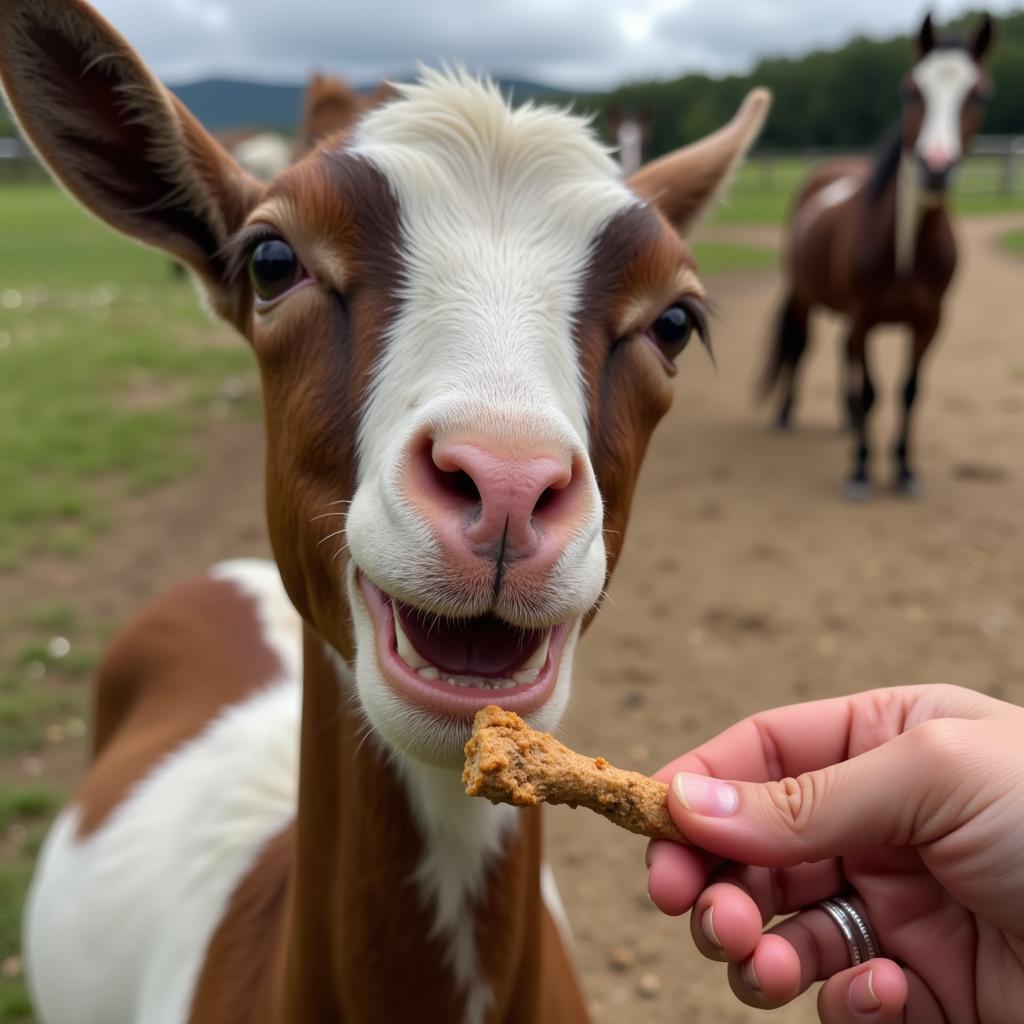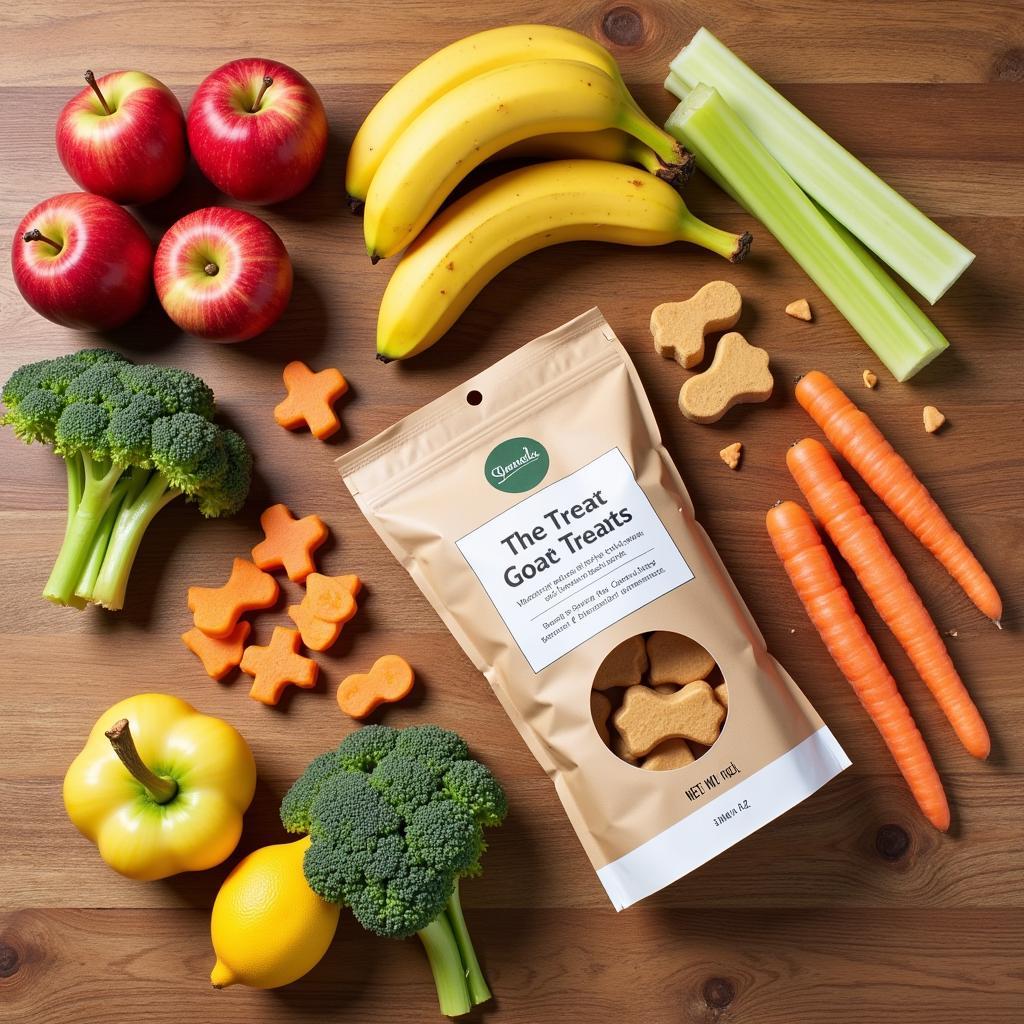Can Goats Have Horse Treats? It’s a question many goat owners ponder, especially those who also keep horses. While goats and horses share some dietary similarities as herbivores, their nutritional needs differ. Sharing treats between these two species requires careful consideration. Let’s delve deeper into the topic to ensure your goats receive the best possible care.
It might seem harmless to toss a horse treat to your curious goat, but certain horse treats can be detrimental to their health. Understanding the nuances of goat and horse digestion is crucial for making informed decisions about their diets. Incorrect feeding can lead to serious health issues in goats, including bloating, mineral imbalances, and even death. This guide will explore the safety and potential risks of giving horse treats to goats, and offer healthier alternatives. Learn how to keep your caprine companions happy and healthy while avoiding dietary pitfalls. Just after learning about goat treats, you might be interested in reading about the best breed of goat for horse companion.
Understanding Goat Dietary Needs
Goats are browsers, meaning they prefer a varied diet of leaves, twigs, shrubs, and vines. Their digestive system is designed to process fibrous plant material efficiently. While they can consume some grains and fruits, these should be offered in moderation. A goat’s rumen, the first compartment of their stomach, houses a complex ecosystem of microorganisms that break down cellulose, allowing them to extract nutrients from fibrous plants. Overfeeding rich treats can disrupt this delicate balance, leading to digestive upset.
The Risks of Horse Treats for Goats
Many horse treats are formulated with ingredients that are not suitable for goats. Some treats contain high levels of molasses, which can cause digestive problems and lead to obesity in goats. Others may include ingredients toxic to goats, such as certain types of nuts or seeds. Additionally, horse treats often lack essential nutrients that goats require, such as copper. Feeding a goat too many horse treats can result in nutritional deficiencies over time.
 Goat Attempting to Eat Horse Treats
Goat Attempting to Eat Horse Treats
Safe Treat Options for Goats
While sharing horse treats is generally discouraged, there are plenty of safe and healthy treat options specifically formulated for goats. These treats often contain a balanced blend of vitamins, minerals, and fiber to support their overall health. Look for treats made from natural ingredients, such as alfalfa, timothy hay, and various fruits and vegetables. Offering a variety of healthy treats can enrich your goat’s diet and provide mental stimulation.
When Sharing Is Okay (In Moderation)
Certain horse treats, such as plain oats or carrots, can be offered to goats in very small quantities as an occasional treat. However, it’s important to avoid treats containing molasses, artificial sweeteners, or other potentially harmful ingredients. Always prioritize goat-specific treats to ensure your goats receive the appropriate nutrition. Moderation is key when offering any treats, even healthy ones, to prevent digestive upset and maintain a balanced diet.
 Healthy and Safe Treats for Goats
Healthy and Safe Treats for Goats
What About a Bacon Horse as a Companion?
While not directly related to treats, having a companion animal can greatly benefit a goat’s well-being. You might be wondering, can a bacon horse be a suitable companion for a goat? Learn more about this intriguing possibility by exploring our article on bacon horse.
Can Goats Eat Horse Feed?
Horse feed is formulated for the specific nutritional needs of horses and is not recommended for goats. Horse feed is typically higher in iron and lower in copper than goat feed, which can create a mineral imbalance in goats. Long-term consumption of horse feed can lead to copper deficiency in goats, which can have serious health consequences.
What are the Signs of Copper Deficiency in Goats?
Signs of copper deficiency in goats can include a rough coat, anemia, weakened immune system, and neurological problems. If you suspect your goat has a copper deficiency, consult with a veterinarian for diagnosis and treatment.
Conclusion
While the question “Can goats have horse treats?” is frequently asked, the answer is generally no. It’s crucial to prioritize your goat’s health by offering treats specifically formulated for their unique dietary needs. By understanding the potential risks and offering healthy alternatives, you can ensure your goats live long, happy, and healthy lives. Remember, a well-informed owner is a key to a thriving goat herd!
FAQ
- What should I do if my goat accidentally eats a horse treat?
- Are there any horse treats that are absolutely toxic to goats?
- What are some signs of digestive upset in goats?
- Can I give my goat horse minerals?
- How can I ensure my goat is getting enough copper?
- What are some other healthy treat alternatives for goats besides store-bought treats?
- How often should I give my goat treats?
For further information on goat companionship, check out our article on the best breed of goat for horse companion.
Need assistance with goat or horse care? Contact us! Phone: 0772127271, Email: [email protected] Or visit us at: QGM2+WX2, Vị Trung, Vị Thuỷ, Hậu Giang, Việt Nam. We have a 24/7 customer service team.